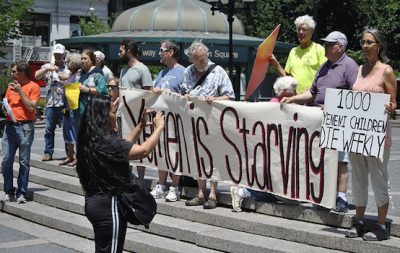The Costs of the War on the People of Yemen

The Guardian published three accounts from Yemeni aid workers working with the Norwegian Refugee Council about their experience of the war and the humanitarian crisis. This comes from Marwan Al-Sabri, a 32-year old water and sanitation officer from Taiz:
We already know that the shelling kills people, but I am seeing what a broken economy does too. People have been left so desperately poor that they kill themselves before the hunger does.
The economic war being waged against the civilian population is often overlooked in coverage of Yemen’s humanitarian crisis, but it is one of the major reasons why almost 16 million people are food insecure even with humanitarian food aid and more than 20 million are food insecure without it. Of those, there are 1.7 million people in the Taiz region that are at crisis, emergency, or catastrophe levels of food insecurity, and that’s with humanitarian food aid. Approximately the same number of people in the Hodeidah governorate are enduring the same deprivation. More than two-thirds of the population of Hajjah governorate in the northwest are suffering the same hardship. More than half of the country’s entire population is in the same position, and conditions are going to keep deteriorating unless the war is brought to a halt and the economy is stabilized.
The experience of the relentless bombing campaign has put people into a state of near-constant anxiety. Ali Al-Makhaathi is 27 and a food security assistant in Amran:
Later that night we heard the jets, a sound that has become strangely routine. Adults barely react to their haunting humming sound now, but it terrifies our children, who run from their beds, petrified.
When they were smaller, we could tell our children that every explosion was the last; comfort them in the short term and hope they would forget by the time of the next bombardment. But they are older now – the bombs have been falling for three and a half years and our children can’t remember a life without fear.
Hadil Al-Senwi, 27, is an education officer in Sanaa. Here she describes how the stress and hardship created by the war have affected an entire generation of Yemeni children:
The idea of childhood that I knew has disappeared and children now carry the burden of stress and labour like adults. An Italian friend said to me that Yemeni children have facial features of people far older.
I feel desperately sorry that our children have tasted nothing but the bitterness of war.
Yemenis will be living with the costs and burdens of conflict for years and decades after the war that has been waged on them finally ends. It is an enduring mark of shame that our government has helped the Saudi coalition do this to them. It is imperative that our participation in perpetuating this disaster be brought to an end.
*
Note to readers: please click the share buttons above. Forward this article to your email lists. Crosspost on your blog site, internet forums. etc.
Featured image is from Creative Commons/Felton Davis

